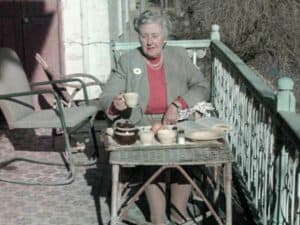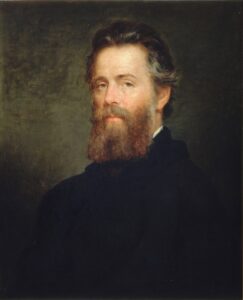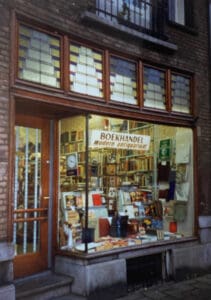Naomi Blindeman
The Case of the Funny Title

Today, while reading Lewis Carroll’s Through the Looking Glass, the line “Come, tell me how you live!” suddenly jumped out at me. I immediately looked at another book lying right next to me, this one by Agatha Christie, called Come, Tell Me How You Live. I could hardly believe it.
I opened the Christie book, which I had not yet started, and turning a page, there was the whole song I had just been reading! It was not just a flight of my imagination, the title of her book is, in fact, from Through the Looking Glass.
Just after the table of contents and a list of illustrations, at the top of the first page, is the title of the song the line was taken from, and beneath that, between parentheses, Christie has added, “With apologies to Lewis Carroll.” And then (Oh!) I noticed the difference: The title she gives is “A-Sitting on a Tell.” In Through the Looking Glass, the title is “A-Sitting On a Gate.” And in fact, Christie’s words to the song are entirely different! Oh, my God! She did a blatant riff on Lewis Carroll’s song, thus the apologies! She made her very own version of it, in a very self-deprecating and funny re-telling of how she met her second husband, Max Mallowan, an archeologist, asking him more than once, “Tell me how you live.”
Thoughts on Herman Melville’s Billy Budd, and Innocence

I’ve just re-read my notes on Billy Budd and they’re so good I can see why I liked the book so much: the quotes I lifted from it, the language Melville uses, and the way he himself seems to fall in love with his character, Billy Budd.
It’s a short little book and it was difficult for me to read because it is so dense and poetic, but also archaic. I read four pages or so a day, and on at least two occasions I understood so little of what I read that the next day I had to re-read those pages, and usually that did actually help.
Part of why I liked it is that I love innocence very much, and Melville seems to love it even more. Billy Budd is, of course, very much about innocence. In fact Melville doesn’t seem to shut up about it.
About Reading

Last year I spent a summer with a friend in a small coastal town in the United States of America. The house we were staying in had a lovely little library of its own, while outside, everywhere we went we found little free library boxes, and every Monday morning the local library in town had a book sale with a very nice selection of books for very sweet prices. The town even had a sprawling, excellently stocked, second-hand bookstore. Go small-town America!
Having spent most of my life in Amsterdam and New York City, from which almost all second-hand bookstores have disappeared, where the free book boxes are usually empty and libraries have become places that are, for various reasons, loud and/or stinky, this was book heaven. It felt almost as good to me as my grandmother’s second-hand bookstore in Noord-Holland had, where, as a child, I spent lots of quiet time reading in corners on the cool and smooth granite floor, with my grandmother’s dog Borretje curled up next to me. I loved books.
After my father died, I stopped reading. And even when I eventually started again, reading never felt like the home it used to. Not even when I found my Big Love book, the book of my heart, Jacob Israel de Haan’s Pijpelijntjes, did reading feel like home the way it once did.
Champignon
The little cafe across the street (one of the only ones on our block that’s not a chain) has died, after 20 years in business. Their loyal customers came all summer and fall, but it wasn’t enough to help them make it through this wretched pandemic. I feel so sad for them
Horsies at the 711
We got lucky because we had just been looking out the window and were sitting up against the radiator, talking and trying to get warm when we heard the hooves. It’s a distinct sound that always makes us leap up and run to the window, but now we were already there.
I opened the window and leaned out, yelling down at them: I love you!

